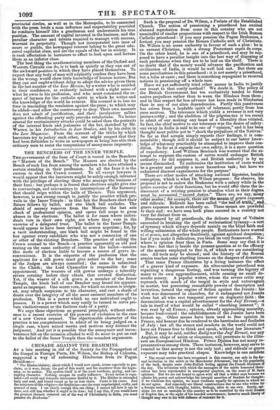THE BAR AND THE NEWSPAPERS.
TEE more judicious members of the bar are heartily vexed at the
s • the members of two circuits have picked with the newspaper press; and would sincerely rejoice to see it decently put an end to. Even on their own showing, the dispute between the bar-messes of the Oxford and Western Circuits and the press was a purely personal quarrel between certain members of the former and one newspaper. This is rather a narrow ground for the broad and sweeping accusations they have brought against newspapers. And what is more, they have never offered one iota of evidence to substantiate their charge—they have never specified with day and date one instance of the conduct by which they say they have been aggrieved ; while on the other hand the gentleman who reported the res gestee of the Oxford Circuit and the con- doctors of the Times explicitly deny that they have ever been guilty of the suppressio veri or suggestio falsi attributed to them. Those members of the bar who have joined in anathematizing the newspaper press appear to have been making a mighty pother about an imaginary offence, which even if real would have been ludicrously disproportioned to the indignation levelled against it.
In the controversy which has arisen out of the misunderstand- ing—if, indeed, it might not with more justice be called the rank jealousy and groundless suspicions entertained by some barristers on the Oxford Circuit towards their more industrious brethren— the gentlemen of the bar have assumed the tone of monitors and moral teachers towards the press. They have been alternately shocked and pained by its indecorums ! They do the newspaper press the injustice of attributing the faults of some who are em- ployed on it to the whole. There are as many branches and classes in the newspaper as in the legal profession : newspapers as well as the law have their sneaking pettifoggers and their shame. less Old Bailey bullies. But the newspaper business has become a separate profession, as distinctly marked out—as permanent as that of merchant or lawyer, and embracing within it as many different classes of industrials. The newspaper combines the cha- racter of a daily (or weekly) register of events ands machinery for the more advantageous publication of pamphlets. The leading articles of newspapers have almost superseded pamphlets. The newspaper business is not a purely literary, but still less is it a mere mechanical one. To succeed in the profession,. a man must combine with no inconsiderable powers of precise and extempore composition, and with considerable tact in selecting topics, discrimination of character, judgment of events, and some skill in mercantile and private financial concerns.
i
In England at least, the writing of a newspaper is subordi- nate to its management : the managers give the. tone to the newspaper press ; and prudence, if no higher motive, impresses such habits on them as commands respect from men of average conventional morality ; for they are protected by no exclusive privileges, and are exposed to rivalry and competition from all quarters. This is the character which the managers of news- papers must assume, if they have it not naturally ; and all who hope to rise in the profession must do the same. 'The new. spaper is a necessity of social life; and in our youngest colonies, our
provincial circles, as well as in the Metropolis, to be connected with the press lends a man influence and respectability provided he conducts himself like a gentleman and understands his true position. The amount of capital invested in the business, and the peculiar character and talents required to manage with success, warrant its perpetuity. Though not incorporated into inns of court or guilds, the newspaper interest belong to the great edu- cated capitalist class, and are the equals of the bar in society. It is rank affectation in barristers to affect to look upon and lecture them as an inferior class.
The best thing the anathematizing members of the Oxford and Western Circuits can do, is to back as quietly as they can out of the awkward position in which they have placed themselves. To expect that any body of men will explicitly confess they have been in the wrong, would show little knowledge of human nature. But they can and ought without delay to adopt the advice given them in the last number of the Lam Review, by a writer who is entitled to their confidence, as evidently imbued with a right sense of what he owes to his profession, and who must command the re- spect of laymen for the catholic spirit in which he writes and the knowledge of the world he evinces. His counsel is to lose no time in rescinding the resolution against the press ; to which may be added—and allow the controversy to drop. Their own measure does not admit of justification, and their inculpatory sallies against the offending party only provoke retaliations. No better arsenal for recriminatory attacks could be asked than the portraits of the internal feuds and jealousies of the bar, sketched by Mr. Warren in his Introduction to Law Studies, and by his critic in the Law Magazine. From the account of the tricks by which barristers try to jockey each other, one might suspect that they had been forbidden to write in newspapers as being less able than ordinary men to resist the temptations of anonymous impunity.



























 Previous page
Previous page